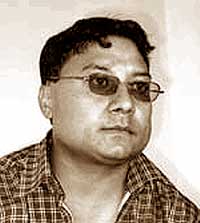 Three weeks after actress Shrisha Karki's suicide, Jana Aastha's editor Kishore Shrestha is still at large. He has been charged with murder for causing her death by publishing a nude photograph of her in his paper on 9 October.
Three weeks after actress Shrisha Karki's suicide, Jana Aastha's editor Kishore Shrestha is still at large. He has been charged with murder for causing her death by publishing a nude photograph of her in his paper on 9 October. Shrestha claims, now, that he is suffering political persecution in this case. Speaking from an unknown location to a radio station in Pokhara on October 25, he accused the film artists leading the campaign against him of trying to frame him, just as in Panchayat times Narayan Man Bijukchhe was framed for the death of Karna Hyoju. He said that he did not blackmail Karki and he regretted her death.
 (See also Shrestha's comment on p 12.) But exposing a fundamental lack of compunction, he also said he had similar pictures of other film artists, and conveyed a veiled threat to them: "A few actors and actresses are engaging in a politics of crowds because they are afraid that pictures of themselves might be printed as well."
(See also Shrestha's comment on p 12.) But exposing a fundamental lack of compunction, he also said he had similar pictures of other film artists, and conveyed a veiled threat to them: "A few actors and actresses are engaging in a politics of crowds because they are afraid that pictures of themselves might be printed as well." None of this will serve him well in his trial. Or trials. In addition to the murder charge, film artists have filed a public offence case against him, and are proceeding with defamation charges for the story that accompanied Karki's photograph. Noted women's rights advocate Shanta Thapaliya is representing these cases.
No doubt, there is politics involved in this matter. Shrestha is a left-leaning journalist who in Panchayat times wrote on the murders of two girls in what was known as the 'Namita and Sunita' scandal: he won no favour from royalist cliques accused in these murders. More recently, he publicised Maoist politburo member Krishna Sen's death in police custody. He surely earned powerful enemies in doing so. Speaking informally about the Karki case, journalists have voiced misgivings about the film artists' motives: why, ask journalists, are these film artists so upset at Karki's death when they refused to join the widespread protest against singer Praveen Gurung's death in a car accident, allegedly by Prince Paras, in August 2000? Are royalist film artists using this opportunity to punish Shrestha for his anti-royalist politics? Are they supporting a 'grand design' to curtail democratic liberties?
Such mistrust made it difficult for even those who strongly condemn Shrestha's action to join hands with the film artists. Progressive and centrist women's groups have spoken out against Shrestha, although their delay in responding says much. Media organisations have struck a cautious balance. The Nepal Press Council has condemned the editor for breaching journalistic ethics, and has demanded an apology and explanation. But, apparently dissatisfied with existing legal avenues, Chairperson Harihar Birahi has asked for a special commission to be formed on the matter. The Federation of Nepalese Journalists has similarly asked Shrestha to offer a public clarification, and has said it will take action against him and other journalists involved in this case. Yet the Federation has also come down against the film artists for attacking Jana Aastha's office, for opting for unlawful means of protest when lawful means were available, and for trying to discredit the entire media. Speaking at the Reporter's Club, the Federation's President Taranath Dahal has said that no one should support a conspiracy to use one journalist's mistake to curtail press freedom.
 The film artists' decision to appeal directly to the king in this case has not allayed widespread suspicions of their political motives.
The film artists' decision to appeal directly to the king in this case has not allayed widespread suspicions of their political motives. For their part, the film artists have dismissed accusations of their political motives, and they have expressed dissatisfaction at the police's slowness to act on this case. Former Sub-Inspector of Police Uddav Bhandari has admitted to shooting Karki's nude photograph to the BBC Nepal Service from London. Taking a high moral tone, he claimed to have paid a film industry go-between Rs 8,000 to bring Karki to his house for sex; once the actress was there, he forcibly took her nude pictures in order to scare her into stopping prostitution. He did not blackmail the actress; it was his intention, he said, to clean up the film industry.
Speaking to Kantipur, Kathmandu's DIG Amar Singh Shah dismissed Bhandari's claims: "This is the product of a criminal mind-frame, which Bhandari is trying to conceal by talking big."
Yet the fact remains that neither Bhandari nor Shrestha have been apprehended. Is there politics involved in this case? Isn't there always?
Still, the central issue is not politics, it is journalistic ethics. Shrestha is masquerading as a political martyr when he is accused of having hounded a woman to death. As journalist Gunaraj Luitel has written, he has now sullied his earlier admirable contributions. His politics cannot exonerate the criminality of his actions now.
Speaking to a radio station in Pokhara, Shrestha stated, "I will not come out to normalise an irregular process. I will remain underground for a few days yet."
He is, of course, not underground. Underground is what political activists can be. Shrestha is what accused criminals are: he is at large.


